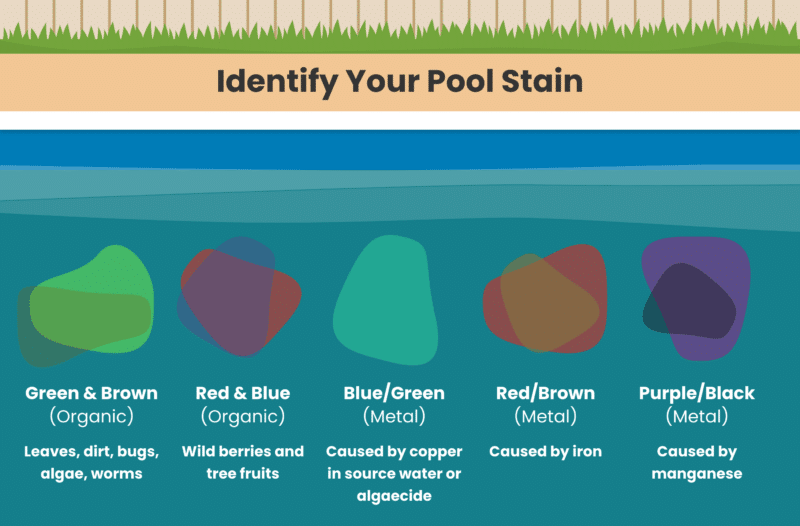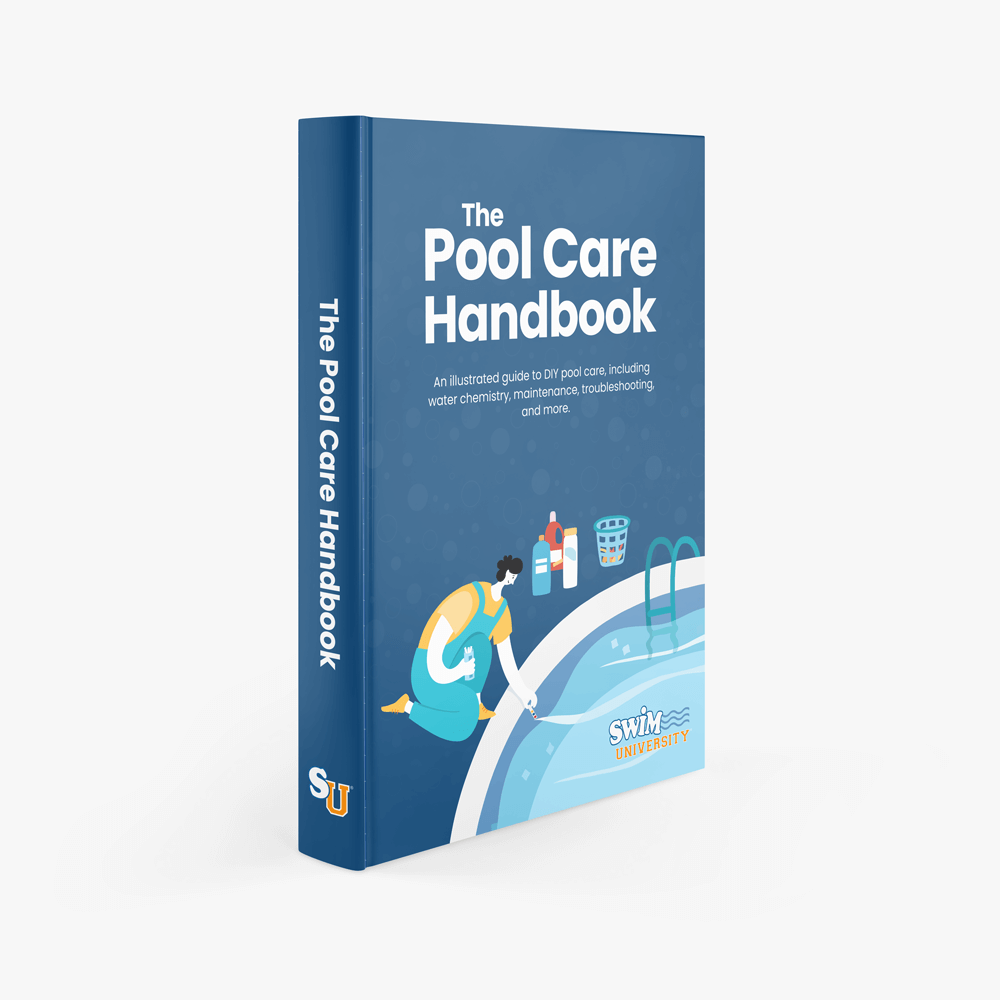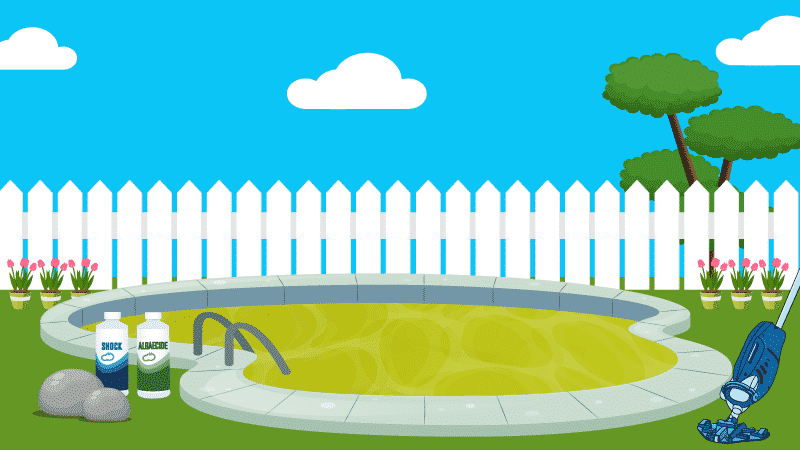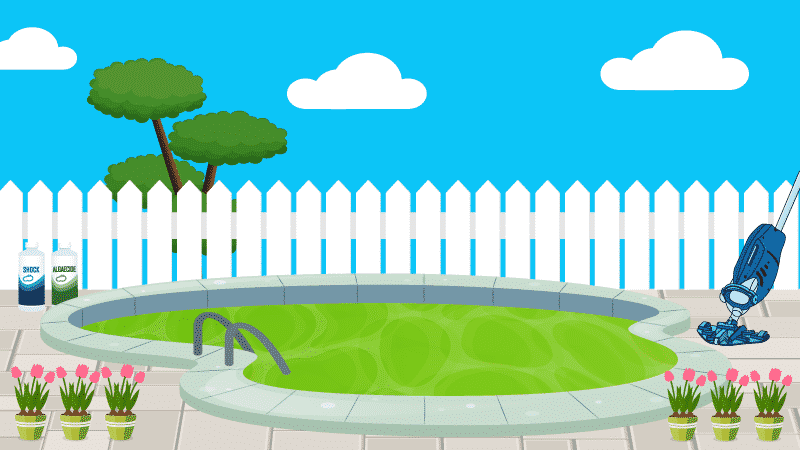How to Identify and Remove Pool Stains
A dirty pool is bad enough. But a stained pool? Yuck! How is that even possible? The truth is, pool owners can be super vigilant about maintenance, and your pool can still end up with stains. The good news is, all you need is a good pool chemical stain remover. The better news is, you can take steps to prevent future pool stains. The key is knowing what caused the stains in the first place.
What Causes Pool Stains?
Before choosing and applying the correct pool stain remover, you need to determine what stained your pool. The most common pool stains generally fall into two categories:
- Organic Stains: Organic materials like leaves, berries, and other organic debris can leave stains if they’re allowed to settle and left too long on your pool walls or floor.
- Metal Stains: Several types of metal can accidentally be introduced into your pool. Maybe your primary water source is a well. Or you have corroded copper pipes in your water system. Rusted metal accessories, parts, and equipment can also cause stains.
Once you determine what type of stain you have, you can decide which type of pool stain remover to use. The best way to figure that out is by the stain’s color.
Green and Brown Pool Stains
These greenish-brown stains are most likely organic stains caused by leaves or other plant matter.
Red or Blue Stains
These are more than likely from brightly colored berries. They’re the most likely culprits if you have berry-bearing trees or bushes near the pool.
Green or Blue Stains
These could be caused by organic matter like leaves or berries. But if there’s nothing like that around your pool, they were likely caused by copper, which can be present in well water. Or if you have copper piping anywhere in your plumbing system, it may be corroded, which can also cause copper stains. This type of staining can also be caused by copper-based algaecides. That’s why we always recommend using a polyquat algaecide like Algacide 60.
Red or Brown Stains
This combination of reddish-brown stains is an indication of iron in the water causing iron stains. If you fill your pool with well water, it likely contains iron. Or perhaps you have iron somewhere in your pool area, such as a fence. If it rusts, and the rust makes its way into your pool somehow (when it rains, for example), you can end up with rust stains.
Purple or Black Stains
This dark color combination (mainly purple stains) is caused by manganese. This naturally occurring metal is present in well water. But it can also be found in municipal water supplies. The water is treated to reduce the amount of manganese, but it’s not completely removed.
Determine the Cause of The Pool Stains
Once you’ve got a good idea of what caused the staining in your pool, you’ll need to test your theory and confirm the source of the problem.
Organic Pool Stain Test
If you suspect an organic stain, apply a small amount of chlorine directly to it. If it’s truly organic, it should go away easily.
Metal Pool Stain Test
Chlorine has little to no effect on metals. This is why some pool accessories, such as ladders, are made of metal. If you suspect a metal stain, apply some ascorbic acid—vitamin C—powder to the stain. If the stain is removed or at least lightened by the powder, it was caused by metal.
How to Remove Pool Stains
Identifying the stains and their sources if only half the battle. Next is removing them.
How To Remove Organic Swimming Pool Stains
As the identification test indicated, chlorine is the solution here. But you’ll need to super-chlorinate the water because the amount you use for regular sanitizing isn’t enough to remove stains. To do that, you’ll use pool shock.
This fast-acting, quick-dissolving swimming pool shock kills bacteria, controls algae, and destroys organic contaminants in pools.
- Test and balance the water: Use test strips or a liquid test kit to ensure the alkalinity is between 100 parts per million (ppm) and 150 ppm, which 125 ppm being ideal, and the pH is between 7.4 and 7.6, with 7.5 being ideal.
- Shock the pool: If you’re dealing with just one small stain, a regular dose of shock should take care of the problem. But if you have multiple or large stains, to get rid of them with just one round of shocking, use a triple dose. This means adding 3 pounds of calcium hypochlorite shock for every 10,000 gallons of water.
- Brush the pool: Use a stiff pool brush to thoroughly scrub the stains. It’s OK if you don’t remove them completely at this point.
- Run the pump: Allow the shock to circulate throughout the pool for at least eight hours or overnight.
- Brush the pool again: During those eight hours, or the next day, scrub the stains again.
- Check the stains: Are they gone? Great, you’re done! Are they still visible? Repeat the process.
Important: Remember always to shock at dusk or night for best results.
Note: If you’re not sure of your pool’s volume, you can use a pool calculator to figure it out.
 Rectangle
Rectangle
 Round
Round
How To Get Rid of Metal Pool Stains
Metal stains can be a little more difficult to get rid of, but it’s not impossible.
- Test the water for metals: It’s a good idea to find out what kind of metal has stained your pool. It can make a difference in the type of pool stain remover you need to get. Some home test kits will test for metals, but your best bet is to take a sample of your pool water to your local pool store and ask them to test it for you.
- Get a metal pool stain remover: Look for one that targets the type of metal that’s stained your pool.
- Follow the instructions: Each pool stain remover will work a little differently, so follow the manufacturer’s instructions to ensure the best results.
Preventing Pool Stains
Once you’ve removed those stains, you’ll want to keep them from coming back. It’ll keep your pool looking nice, and will save you the extra work of removing them.
How to Prevent Organic Pool Stains
With just a little pool care, you can keep organic contaminants from making their mark on your pool.
- Keep the pool water balanced at all times, especially the alkalinity, pH, and sanitizer levels.
- Practice proper pool cleaning by using an robotic pool cleaner, or by manually vacuuming on a regular basis.
- Skim the pool surface often to keep leaves, twigs, and other organic debris from sinking to and settling on the bottom of the pool where they can stain.
- Move plants that bear fruit away from the pool area. If you plan to do some pool landscaping, make sure you plant fruit-bearing trees and shrubs well away from the pool.
- Check the pool regularly for stains. If you find any, take steps to remove them while they’re still small.
How to Prevent Metal Pool Stains
It’ll take a little more pool maintenance, but you can keep metals from making your pool look ugly.
- Test your water source for metals. Use a hose filter when filling or refilling your pool if they’re present.
- Use a metal sequestrant in your pool. This chemical binds with metal particles to keep them from settling on pool surfaces and to make it possible for them to be removed by the pool filter.
- Maintain your pool plumbing. If any parts of it use copper pipes, check them regularly for corrosion, and replace them when necessary.
- Keep the pH level in your pool steady. This is especially important if you have copper in your water. A low pH level will make the water acidic, which will corrode copper, oxidize it, and stain your pool.
Important: A metal sequestrant is not a metal pool stain remover. It can help prevent stains by making it easier for metals to be removed from the water. But once you have a metal stain, a sequestrant will not remove it.
Finding a stain in your pool can be dismaying at first. But once you can identify the cause and the source of the stain, you’ll be able to remedy it easily. Then it’s just a matter of preventing future stains.
Still, it’s always a good idea to keep plenty of pool shock and metal pool stain remover on hand, just in case.
Happy Swimming!
4 Ways We Can Help With Your Pool
- Pool Care Cheat Sheets (Free): Easy-to-use downloadable guides to help you keep track of taking care of your pool this year.
- The Pool Care Handbook: An illustrated guide to DIY pool care, including water chemistry, maintenance, troubleshooting, and more.
- The Pool Care Video Course: You’ll get 30+ step-by-step videos and a downloadable guide with everything you need to know about pool maintenance.
- The Pool Care App: Enter your water test results. Get a custom treatment plan. Know exactly what chemicals to add to keep your pool clear.











